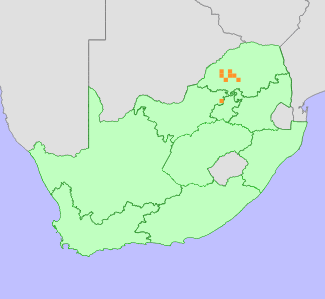|
Scientific Name | Thesium celatum N.E.Br. |
Higher Classification | Dicotyledons |
Family | SANTALACEAE |
National Status |
Status and Criteria | Vulnerable B1ab(iii,iv,v)+2ab(iii,iv,v) |
Assessment Date | 2022/10/14 |
Assessor(s) | N. Lombard |
Justification | A species endemic to the northern parts of South Africa, it has an extent of occurrence (EOO) of 11 370 km² and an area of occupancy (AOO) of between 40 km² and 200 km². It is known from seven to nine locations. The population is inferred to be declining due to habitat loss and degradation caused by urban and agricultural developments at three of the known locations, and the subpopulation from the type location has been lost to crop development. Several subpopulations occur in protected areas and are not threatened. Two subpopulations of this species have been observed for the first time in the past two years following field expeditions. It is therefore possible that more subpopulations remain undiscovered. Based on known records this species qualifies for a threat status of Vulnerable under Criterion B. |
Distribution |
Endemism | South African endemic |
Provincial distribution | Limpopo, North West |
Range | This species is a near endemic to the Limpopo Province, South Africa. It occurs mainly in the Waterberg area, but there is one isolated subpopulation in the vicinity of Brits in the North West Province. |
Habitat and Ecology |
Major system | Terrestrial |
Major habitats | Savanna |
Description | It grows in sandy soils in grassy savanna. |
Threats |
| Most of the natural habitat at the type locality (Zandrivierspoort) has been transformed for agricultural purposes and it is very probable that this subpopulation has been lost. Three other subpopulations are potentially threatened by habitat loss and degradation due to urban and crop developments. |
Population |
Due to the loss of suitable habitat the population is inferred to be declining. It is possible that under explored areas will reveal more subpopulations. One subpopulation of more than 200 individuals is known from the Lapalala area (pers. comm., Manuel Popp, 2022). The sizes of other subpopulations are not known.
|
Population trend | Decreasing |
Assessment History |
Taxon assessed |
Status and Criteria |
Citation/Red List version | | Thesium celatum N.E.Br. | Data Deficient (Taxonomically Problematic) | Raimondo et al. (2009) | |
Bibliography |
Burtt Davy, J. 1932. A manual of the flowering plants and ferns of the Transvaal with Swaziland, South Africa. Part II. Malvaceae-Umbelliferae. Longmans, Green & Co., London.
Raimondo, D., von Staden, L., Foden, W., Victor, J.E., Helme, N.A., Turner, R.C., Kamundi, D.A. and Manyama, P.A. 2009. Red List of South African Plants. Strelitzia 25. South African National Biodiversity Institute, Pretoria.
|
Citation |
| Lombard, N. 2022. Thesium celatum N.E.Br. National Assessment: Red List of South African Plants version 2024.1. Accessed on 2026/02/24 |
 Comment on this assessment
Comment on this assessment


